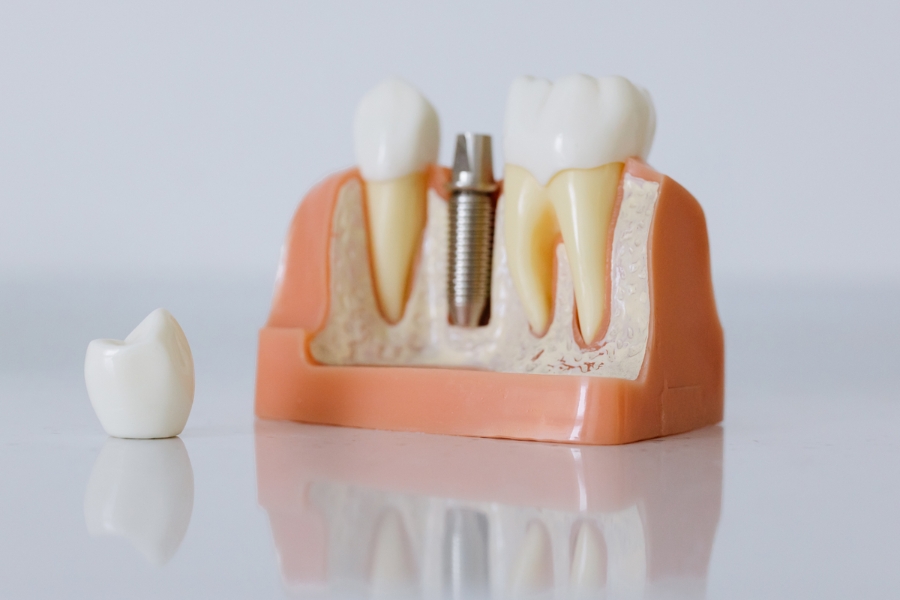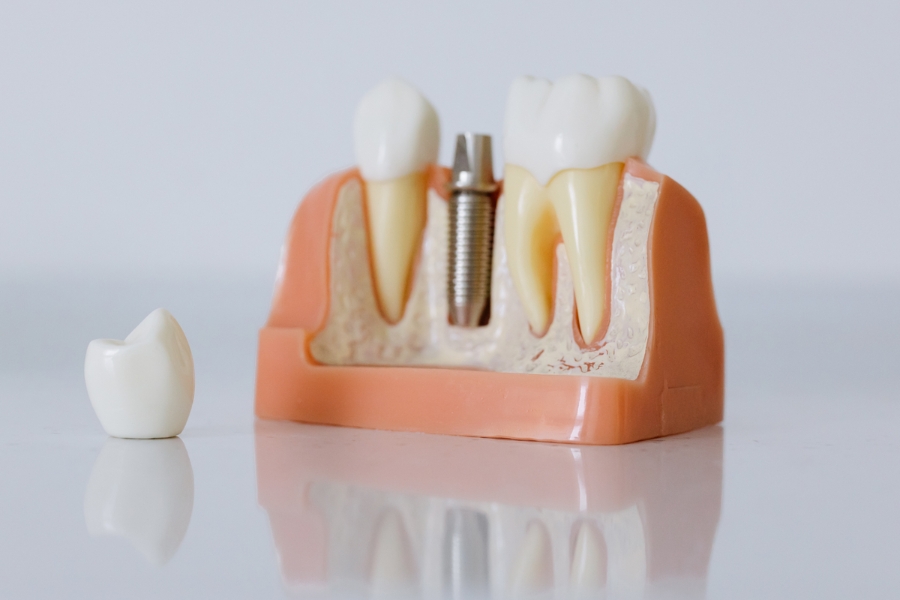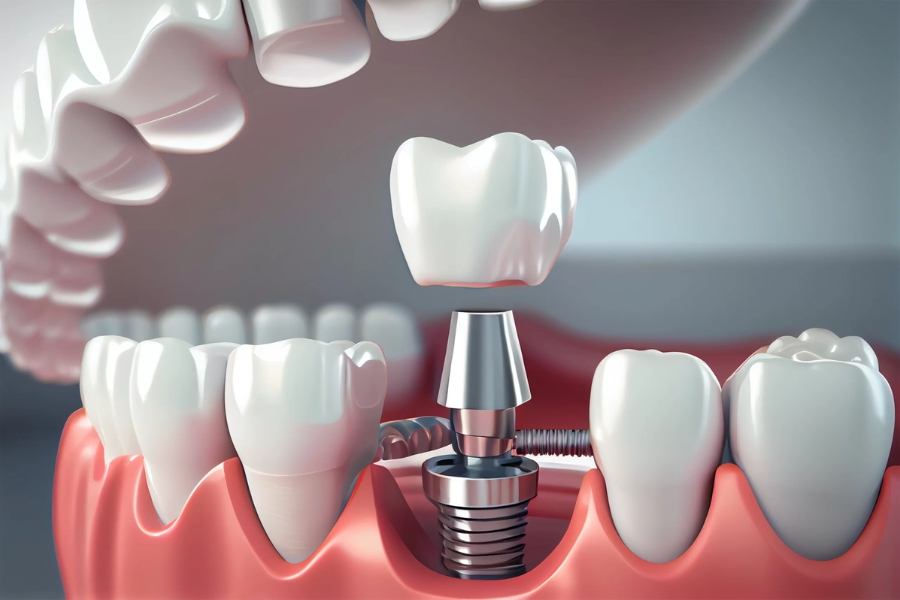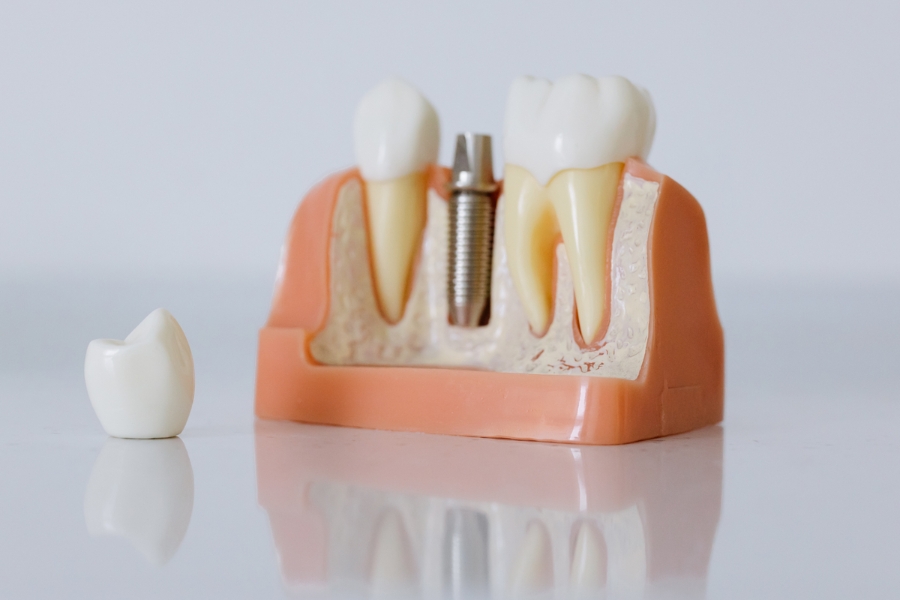Caring for Your Dental Implants: Essential Tips for Long-Lasting Results

Dental implants have revolutionized the field of dentistry, offering a durable and aesthetically pleasing solution for those with missing teeth. While they are designed to be a long-term solution, the longevity and success of dental implants greatly depend on how well you care for them. Proper maintenance not only ensures the durability of the implants but also protects your overall oral health. In this comprehensive guide, we’ll cover everything you need to know to keep your dental implants in top condition for years to come, so you can start caring for your dental implants.
Understanding Dental Implants
Before diving into care tips, it’s important to understand what dental implants are and how they work. A dental implant is a titanium post surgically placed into the jawbone, serving as a replacement for the root of a missing tooth. Over time, the implant fuses with the jawbone in a process called osseointegration, providing a stable foundation for a prosthetic tooth (crown), bridge, or denture.
The Importance of Dental Implant Care
Unlike natural teeth, dental implants are not susceptible to decay. However, they can still be affected by gum disease and other oral health issues if not properly cared for. Peri-implantitis, an inflammatory condition similar to gum disease, can cause the loss of the implant if the surrounding tissue becomes infected.
Proper care of dental implants involves maintaining good oral hygiene, regular dental check-ups, and adopting healthy lifestyle habits. Here’s how to ensure your dental implants remain in optimal condition:
1. Establish a Thorough Oral Hygiene Routine
Maintaining a consistent and thorough oral hygiene routine is crucial for the health of your dental implants and the surrounding tissues. Here’s how you can do it:
Brushing
- Use a Soft-Bristled Toothbrush: A soft-bristled toothbrush or an electric toothbrush with soft bristles is ideal for cleaning around implants. These are gentle on the gums and effective in removing plaque.
- Brush Twice Daily: Make it a habit to brush at least twice a day, preferably after meals and before bed, to remove food particles and plaque.
- Proper Technique: Hold your toothbrush at a 45-degree angle to the gumline and use gentle circular motions to clean the teeth and gum areas. Pay special attention to the areas around the implant.
Flossing
- Floss Daily: Flossing once a day helps remove plaque and food particles between teeth and around the implants.
- Use Implant-Specific Floss: There are special types of floss designed for use with dental implants, such as super floss or implant threaders, which can be more effective in cleaning around the implant posts.
- Floss Technique: Gently slide the floss between your teeth, making sure to curve it around each tooth in a C-shape and moving it up and down to clean the sides of the teeth and under the gumline.
Interdental Brushes and Water Flossers
- Interdental Brushes: These small brushes are effective for cleaning between teeth and around implants. Choose the right size to avoid damaging the gum tissue.
- Water Flossers: A water flosser can be a useful addition to your oral hygiene routine. It uses a stream of water to remove plaque and food particles from hard-to-reach areas.
2. Regular Dental Check-Ups and Cleanings
Regular dental visits are essential for the long-term health of your dental implants. Your dentist will monitor the condition of your implants and surrounding tissues, providing professional cleanings and addressing any issues early on.
Professional Cleanings
- Frequency: Schedule professional dental cleanings at least twice a year, or more frequently if recommended by your dentist.
- Specialized Care: Dentists and hygienists have specialized tools and techniques to clean around implants effectively, removing plaque and tartar buildup that regular brushing and flossing might miss.
Check-Ups
- Comprehensive Exams: Regular check-ups allow your dentist to examine the integrity of your implants, check for signs of peri-implantitis, and assess your overall oral health.
- X-Rays: Periodic X-rays help monitor the bone level around the implants, ensuring that there are no signs of bone loss or other issues.
3. Adopt a Healthy Diet
A healthy diet plays a significant role in maintaining the health of your dental implants and overall oral health. Here are some dietary tips to follow:
Avoid Sugary and Acidic Foods
- Limit Sugary Snacks and Drinks: Excessive sugar can lead to plaque buildup, increasing the risk of gum disease and peri-implantitis.
- Reduce Acidic Foods and Beverages: Acidic foods and drinks can erode the enamel of natural teeth and irritate the gums around the implants.
Eat a Balanced Diet
- Incorporate Fruits and Vegetables: These are rich in vitamins and minerals essential for gum health.
- Choose Lean Proteins: Proteins such as fish, chicken, and legumes support tissue repair and bone health.
- Dairy Products: Foods rich in calcium, such as milk, cheese, and yogurt, help maintain strong bones and teeth.
4. Avoid Harmful Habits
Certain habits can negatively impact the longevity of your dental implants. Avoiding these can help maintain the health of your implants and surrounding tissues.
Smoking
- Quit Smoking: Smoking is a major risk factor for peri-implantitis and can significantly affect the success of dental implants. It impairs healing and reduces blood flow to the gums, increasing the risk of infection and bone loss.
Teeth Grinding and Clenching
- Manage Bruxism: Teeth grinding and clenching, known as bruxism, can put excessive pressure on dental implants, leading to damage or implant failure. Consider wearing a nightguard if you grind your teeth during sleep.
5. Use the Right Oral Care Products
Choosing the right oral care products can make a difference in the maintenance of your dental implants.
Toothpaste
- Non-Abrasive Toothpaste: Use a toothpaste that is non-abrasive to avoid scratching the surface of the implants.
- Fluoride Toothpaste: Fluoride toothpaste helps protect natural teeth from decay and can be beneficial for overall oral health.
Mouthwash
- Antimicrobial Mouthwash: Using an antimicrobial mouthwash can help reduce bacteria in the mouth, lowering the risk of gum disease around the implants.
- Alcohol-Free: Opt for an alcohol-free mouthwash to avoid drying out the mouth, which can affect gum health.
6. Address Issues Promptly
If you notice any issues with your dental implants, such as discomfort, swelling, or changes in the fit of the prosthetic, contact your dentist immediately. Early intervention can prevent minor problems from becoming major complications.
7. Maintain Good Overall Health
Your overall health can influence the success of your dental implants. Conditions such as diabetes and osteoporosis can affect bone health and healing. Managing these conditions and maintaining a healthy lifestyle can support the longevity of your implants.
Regular Medical Check-Ups
- Monitor Chronic Conditions: Regular check-ups with your healthcare provider can help manage conditions that might affect your oral health.
- Healthy Lifestyle: Exercise, a balanced diet, and avoiding tobacco use contribute to overall health, supporting the success of your dental implants.
Caring for your dental implants requires a combination of good oral hygiene practices, regular dental visits, a healthy diet, and avoiding harmful habits. By following these tips, you can ensure that your dental implants remain in excellent condition, providing you with a beautiful and functional smile for many years.
Remember, your dentist is your best resource for personalized advice and care. Regular consultations and professional cleanings are key to the long-term success of your dental implants. Invest in your oral health today, and enjoy the benefits of a confident, healthy smile for a lifetime.




